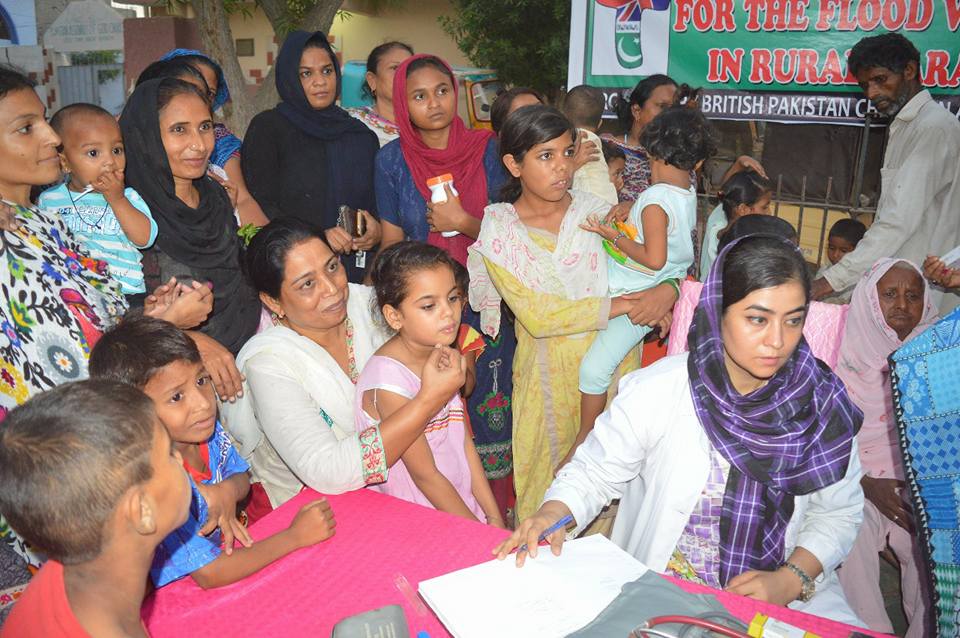Over 4 extremely busy days a professional medical team served over 300 Christian victims of the Karachi flood, many of whom were found to have been affected
by water contaminated by overflowing sewage and rife with waterborne disease.
Two cities were visited one was Essa Nagri and the other Malir Cantt and very similar medical conditions were detected in both regions. Two doctors
and four nurses helped serve the constant flow of people interested in a medical check or treatment for illness.
On the first day 42 patients were seen,on the second day 88 patients on the third day we met with 96 patients and 102 on the last day. News soon
spread about the free medical camp and medicines and many of those who came for help had their first encounter with a doctor, for most of the others it
was a rare opportunity to see a doctor.
Almost all the patients were Christians until the last day when one Memon family in Malir town. In Essa Nagri all were Christian. The Memon Muslim
people migrated to Karachi from India after the 1947 partition and have their own language as well as Urdu.
A number of illnesses and diseases were diagnosed during the medical camp, some of the treatable and preventable diseases detected could have been fatal
if not diagnosed by our medical team. Some of the patients brought to the medical team had been carried across by friends and family in critical condition.
In these cases immediate treatment was provided and BPCA paid for transport of the patient to a local hospital.
27 women were suffering from cellulitis
22 people were diagnosed with diabetes
There were many patients who were also diagnosed with more general conditions such as:
Malnutrition
For Mehwish Bhatti our lead officer it was a rare opportunity for her to meet the Christians of Karachi an area she very rarely visits. Here she
was able to provide counsel and pray with people who are extremely disenfranchised.
“After the floods many of us became sick, but no-one came to help.
“Anyone on the ground floor of a condo had their entire homes flooded, people died from electrocutions and drowning.
Thank God that people on higher floors helped us to safety.
“Water rose so quickly it destroyed all the unprotected food in grocery stores and our homes -we had nothing to eat for days
until BPCA came with provisions. We all shared food with each other so that everyone had some.
“The water left a stink everywhere old sewage pipes leaked in the streets and we all became so sick. Many people have
been vomiting and have had diarrhoea it has been a traumatic time. Two people died from their illnesses.
“The furniture and the possessions we had were either [irreversibly] damaged or washed into the streets. The floods caused
great devastation and we all feel so depressed.
Harrison Samson (32 yrs), said: “I often think we are a forgotten community thought of as worthless by society.
We are all street cleaners and sewage workers here and are often ignored. This [welfare] programme has really encouraged
me it has been nice to speak with people who actually care about my quality of life.”
“Many of the patients had quite critical conditions due to busy lifestyles and being unable to afford medicines they had let their bodies run down.
It was great to be able to restore some of the vitality of the patients but many need longer term treatment. We have sent some severely ill patients to hospital and others have been advised of follow up tests they should source from a local hospital.
“I counselled many flood victims and prayed for them, some feel depressed from having lost so many possessions, others have been extremely sick. I prayed with them and assured them of further prayer.”
Wilson Chowdhry, Chairman of the BPCA said:
“Many Christians delay seeking medical assistance for ailments due to expensive medical costs and long distances to travel to hospital. It was a real blessing for our team to be able to provide a suffering community with aid that has potentially saved lives.
“Victims diagnosed with serious or long term conditions need to avail themselves of local hospital facilities and the Government has to do more to make this happen.
“The short life span of Christians in regions like Essa Nagri should be assessed by the Government of Pakistan, so that we can reduce the premature deaths of so many Christians in rural settings.
“A priority should be the installation of clean water facilities, bathroom facilities and cheaper more accessible healthcare facilities. Moreover the local sewage sytems should be modernised to prevent release of toxins through seepage especially during floods. Flood protection measures should also be introduced to safeguard against waterborne illnesses, or victims such as these families will continue to suffer.”
Victims have access to Mehwish’s telephone number and know that she is available at the end of a line should they need further assistance. Calls have been frequent and BPCA is working on initiating a 24 hour persecution report, prayer and counselling telephone line that would be free for all Christians or those seeking Christian prayers across the country.
To make the Givernment realise the importance of this work, we want to raise £2500 to install a walter filtration unit and a public washroom, that will help these communities have clean drinking water and a place wash themselves more safely and hygenically. If you would like to donate to this project please (click here). We will assess the sucess of this project and share data with the Government of Pakistan in hope it will trigger a more concerted effort to resolve ongoing health problems in rural communities.










